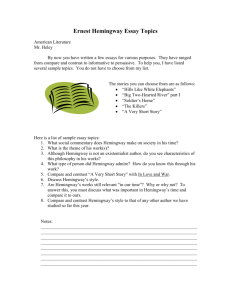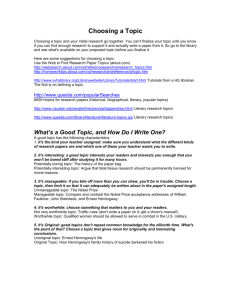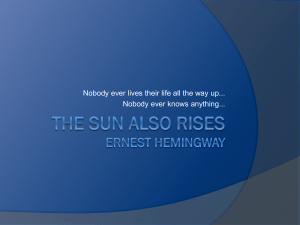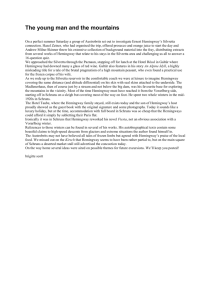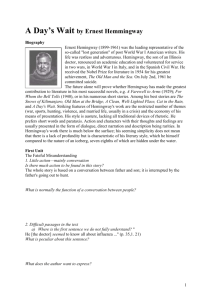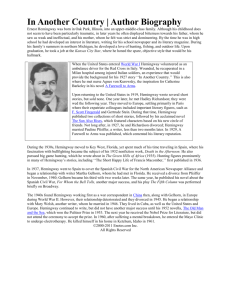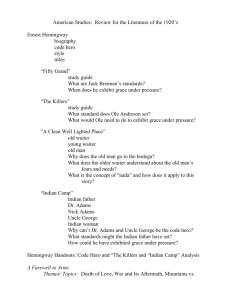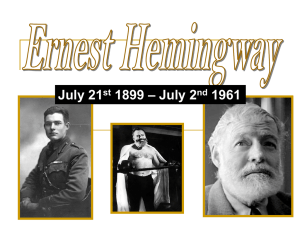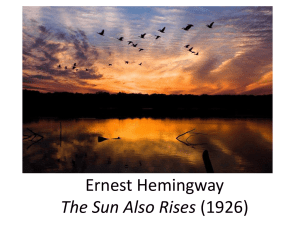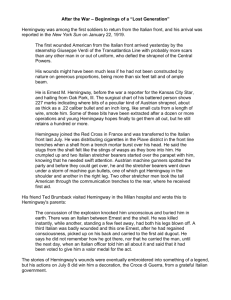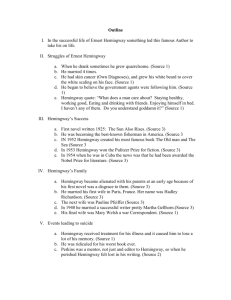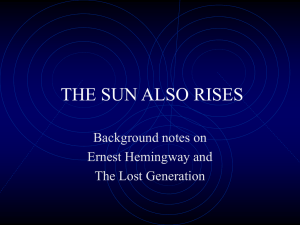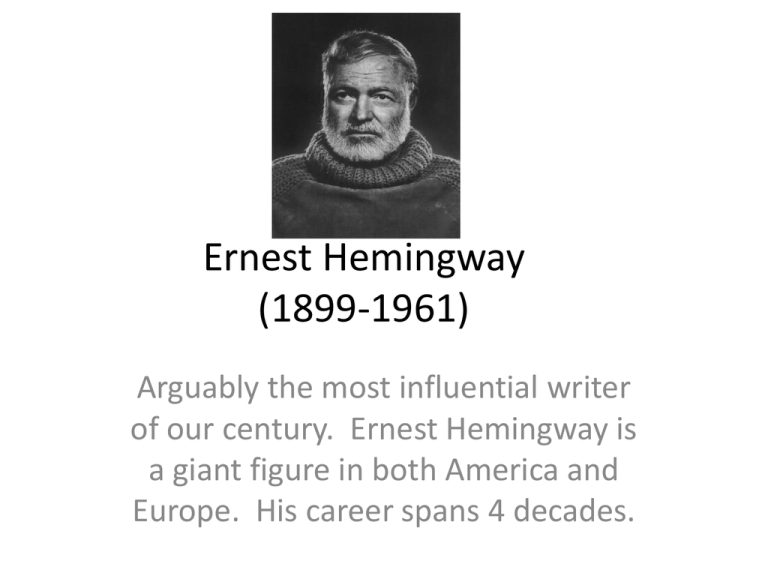
Ernest Hemingway
(1899-1961)
Arguably the most influential writer
of our century. Ernest Hemingway is
a giant figure in both America and
Europe. His career spans 4 decades.
His Early Life
• Born and raised in Oak Park,
Illinois, one of six children
• Father: successful doctor. He
taught his son how to be the
ultimate outdoorsman.
However, he took the more
submissive role in his marriage.
Father eventually committed
suicide.
• Mother: a music teacher.
Strained relationship with
Ernest. Took the more
dominant role in the marriage.
Early Career
• Began writing career as a reporter at the
Kansas City Star after high school
• Served as an ambulance driver and infantry
soldier with the Italian army when an eye
problem kept him out of the US Army.
The Lost Generation:
• A large group of expatriate writers in Europe, including:
Gertrude Stein, Sherwood Anderson, Ezra Pound and F. Scott
Fitzgerald
• The "Lost Generation" defines a sense of moral loss or
aimlessness apparent in literary figures during the 1920s.
World War I seemed to have destroyed the idea that if you
acted virtuously, good things would happen. Many good,
young men went to war and died, or returned home either
physically or mentally wounded and their faith in the moral
guideposts that had earlier given them hope, were no longer
valid.
• These literary figures also criticized American culture in
creative fictional stories which had the themes of self-exile,
indulgence (care-free living) and spiritual alienation.
Hemingway defined the Code Hero as "a man who lives correctly,
following the ideals of honor, courage and endurance in a world
that is sometimes chaotic, often stressful, and always painful."
• The "code" dictates that the hero act honorably in the midst
of what will be a losing battle. In doing so he finds fulfillment:
he becomes a man or proves his manhood and his worth. The
phrase "grace under pressure" is often used to describe the
conduct of the code hero.
• The Code Hero is typically an individualist and free-willed. He
never shows emotions; showing emotions and having a
commitment to women shows weakness. Qualities such as
bravery, being adventuresome and travelling often also define
the Code Hero.
• One should court death, in the bull ring, on the battlefield,
against big fish, because facing death teaches us how to live.
Code Hero Continued…
• Hemingway man was a man’s man: involved in a great deal of
drinking, moved from one love affair to another, who
participated in wild game hunting, who enjoyed bullfights,
who was involved in all of the so-called manly activities
• “Don’t let’s talk about it.” After he has performed some act
of bravery he will not discuss it. Talking is emotionalism; it is
the action that is important. If you talk about the act too
much you lose the importance of the act itself. He is man of
action rather than a man of theory.
• He will often stay awake at nighttime and sleep all during the
day--sleep itself is a type of obliteration of the
consciousness. Night is a difficult time for it symbolizes the
utter darkness that man will have to face after
death. Therefore the code hero will avoid nighttime. This will
be the time he will drink or carouse or stay awake.
Grace Under Pressure
• He never toyed with minor themes. He wrote of life and
death, of time and towns (which he called cities), and of the
courage he liked to call "grace under pressure."
• He put his characters in situations where society had already
broken down. He pictured the social order as disorder, a kind
of natural catastrophe like a river in flood. The individual
could save himself only by relying on himself.
• Hemingway man must have fear of death, but he must not be
afraid to die. He must not show that he is afraid or trembling
or frightened in the presence of death.
Hemingway Style
• “One true sentence…” was Hemingway’s mantra
• Rejected big words as being false to experience.
• He also employed a technique by which he left out essential
information of the story in the belief that omission can
sometimes strengthen the plot of the novel.
• He cut out the adjectives and prompting words that tell a
reader how to feel and replaced them with spare, brisk
monosyllables that he called the "ugly short infantry of the
mind." Hemingway spliced his images together like a film
editor so that the action was always advancing on the reader
rather than the reader following the action.
Height of Career
• Won Pulitzer Prize in 1953 for The Old Man and the
Sea
• Won Nobel Prize for Literature in 1954
• Other famous works include: The Sun Also Rises, A
Farewell to Arms, The Snows of Kilimanjaro,
For Whom the Bell Tolls, among others.
In His Writing, Hemingway Taught Us:
• About war…in particular, trauma—the pain
and damage to the body, as well as the dignity
and courage of men
• About sports…hunting, fishing,
skiing, bullfighting,
boxing—a confrontation with pain.
Opportunity for Grace Under Pressure.
• About foreign cities…like Paris, San Sebastian,
Pamplona, etc.
Hemingway “Curve” moves from fresh,
spare, tight-lipped early prose of the
1920’s—focusing on hunting, fishing,
boxing, bullfighting, war, love, and
death—to an increasingly soft, prose that
seeks to recapture his original greatness.
End of career
• Seriously injured in a plane crash in Africa and
never fully recovered his mental health or
productivity.
• Committed suicide in 1961 after years of
suffering from despair and paranoia.
Life After Death
• He believes in "Nada," a Spanish word meaning nothing. Along with this,
there is no after life.
• If man cannot accept a life or reward after death, the emphasis must then
be on obtaining or doing or performing something in this particular life. If
death ends all activity, if death ends all knowledge and consciousness,
man must seek his reward here, now, immediately. Consequently, the
Hemingway man exists in a large part for the gratification of his sensual
desires (eating, drinking, sex), he will devote himself to all types of
physical pleasures because these are the reward of this life.

